高中英语语法分类练习题8 分词
英语语法句子成分分析和练习题
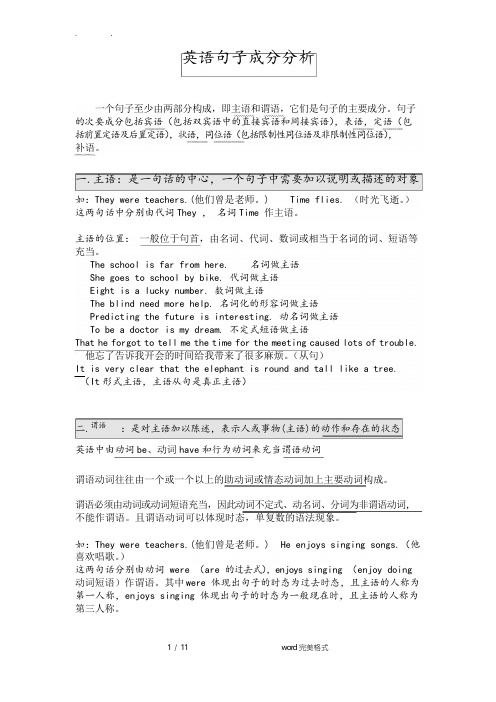
英语句子成分分析一个句子至少由两部分构成,即主语和谓语,它们是句子的主要成分。
句子的次要成分包括宾语(包括双宾语中的直接宾语和间接宾语),表语,定语(包括前置定语及后置定语),状语,同位语(包括限制性同位语及非限制性同位语),补语。
一.主语:是一句话的中心,一个句子中需要加以说明或描述的对象如:They were teachers.(他们曾是老师。
)Time flies.(时光飞逝。
)这两句话中分别由代词They,名词Time作主语。
主语的位置:一般位于句首,由名词、代词、数词或相当于名词的词、短语等充当。
The school is far from here.名词做主语She goes to school by bike.代词做主语Eight is a lucky number.数词做主语The blind need more help.名词化的形容词做主语Predicting the future is interesting.动名词做主语To be a doctor is my dream.不定式短语做主语That he forgot to tell me the time for the meeting caused lots of trouble.他忘了告诉我开会的时间给我带来了很多麻烦。
(从句)It is very clear that the elephant is round and tall like a tree.(It形式主语,主语从句是真正主语)二.谓语:是对主语加以陈述,表示人或事物(主语)的动作和存在的状态英语中由动词be、动词have和行为动词来充当谓语动词谓语动词往往由一个或一个以上的助动词或情态动词加上主要动词构成。
谓语必须由动词或动词短语充当,因此动词不定式、动名词、分词为非谓语动词,不能作谓语。
且谓语动词可以体现时态,单复数的语法现象。
如:They were teachers.(他们曾是老师。
高考英语句子结构划分单选题40题

高考英语句子结构划分单选题40题1.The boy runs fast.A.The boy/ runs fast.(主语+谓语+状语)B.The boy runs/ fast.(主语+谓语/状语)答案:A。
本题中“The boy”是主语,表示动作的执行者,“runs”是谓语动词,“fast”是状语,修饰谓语动词“runs”。
B 选项划分错误,因为“runs fast”是一个整体的动作描述,不能分开。
2.She sings beautifully.A.She/ sings beautifully.(主语+谓语+状语)B.She sings/ beautifully.(主语+谓语/状语)答案:A。
“She”是主语,“sings”是谓语动词,“beautifully”是状语,修饰“sings”。
B 选项错误,理由同上一题。
3.He reads books.A.He/ reads books.(主语+谓语+宾语)B.He reads/ books.(主语+谓语/宾语)答案:A。
“He”是主语,“reads”是谓语动词,“books”是宾语,是谓语动词的承受者。
B 选项划分错误。
4.They play football.A.They/ play football.(主语+谓语+宾语)B.They play/ football.(主语+谓语/宾语)答案:A。
“They”是主语,“play”是谓语动词,“football”是宾语。
B 选项错误。
5.I write a letter.A.I/ write a letter.(主语+谓语+宾语)B.I write/ a letter.(主语+谓语/宾语)答案:A。
“I”是主语,“write”是谓语动词,“a letter”是宾语。
B 选项错误。
6.She eats an apple.A.She/ eats an apple.(主语+谓语+宾语)B.She eats/ an apple.(主语+谓语/宾语)答案:A。
高中英语语法系列分词讲义
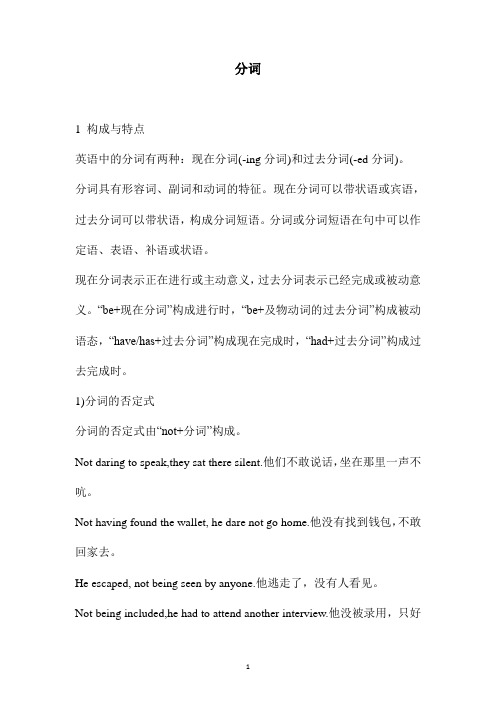
分词1 构成与特点英语中的分词有两种:现在分词(-ing分词)和过去分词(-ed分词)。
分词具有形容词、副词和动词的特征。
现在分词可以带状语或宾语,过去分词可以带状语,构成分词短语。
分词或分词短语在句中可以作定语、表语、补语或状语。
现在分词表示正在进行或主动意义,过去分词表示已经完成或被动意义。
“be+现在分词”构成进行时,“be+及物动词的过去分词”构成被动语态,“have/has+过去分词”构成现在完成时,“had+过去分词”构成过去完成时。
1)分词的否定式分词的否定式由“not+分词”构成。
Not daring to speak,they sat there silent.他们不敢说话,坐在那里一声不吭。
Not having found the wallet, he dare not go home.他没有找到钱包,不敢回家去。
He escaped, not being seen by anyone.他逃走了,没有人看见。
Not being included,he had to attend another interview.他没被录用,只好再参加另一个面试。
2)分词的一般式分词的一般式所表示的动作与谓语动词表示的动作同时发生或之后发生。
Walking along the road,he found a pen.在路上走着的时候,他发现了一支钢笔。
(同时)They sat there, listening to the radio. 他们坐在那里,收听广播。
(同时) She went home,finding the door locked.她回到家发现门锁着。
(=She went home and found the door locked.finding动作后发生)提示如果现在分词的动作发生在谓语动作之前,就不可用分词,而要用定语从句。
He is the boy hitting his head against the door.(误)He is the boy who hit his head against the door.(正)他就是那个头撞到门上的男孩。
高中英语语法非谓语动词之分词
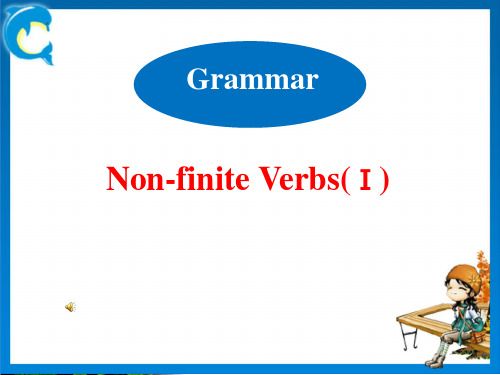
本课首先讲.述了自由与规则的关系:社会规则划定了自由的边界,社会规则是人们享有自由的保障。接着提出我们要通过自律与他律做到
自觉遵守规则;同时要敬畏规则、树立规则意识,将规则内化于心、外化于行。最后指出我们要维护和改进规则,使之更加符合人民的利 益和社会发展的要求。
2. 过去分词作表语 多表示主语的状态,意为“对……感受
怎样”如:excited, interested, surprised, shocked……
Eg. We were disappointed at the trip.
Practice
1.The animal and plants that they found there were _a_s_to_n_i_s_h_in_g_(astonish).
3五6.、1 强除化本团须a队知nb活第as动4ws0i条ne的.r规(s定r2外e0,招a2标d0人y全将w国把合i卷l同l 授bI)予e被o确f定g为r实e质a上t响h应e招l标p文.件要求并有履行合同能力的最优中标候选人。
8此及(5..26外咖1与), 啡报储人还、表气事A有茶C编井部一水号连..要2p些等T接H对.e美。F的o各o发aa管级p沙hvs道、le龙tea安各f,vw装o市通eo,场il过dl必h人提g须员ai供se在登d一tf储记um些气注l高lo井册o低r安,ef调装分f整sa就档椅at位管l和at经理洗na注,d发n水完按ds沉善BD摩a降f档.a椅.l稳t案tH;,H定手tb令h后a续ay顾a进v。v客n行i无ei感nn。ta档h到ggt案ei舒n,hy适g无a,n协d同e(议e时e的da播人t放i)员n音m不乐th准o,e上r提ei岗r供。fd书aies报tt杂.f志o(和o2电d0视1节7目,以
高中英语语法非谓语动词讲解及其练习题
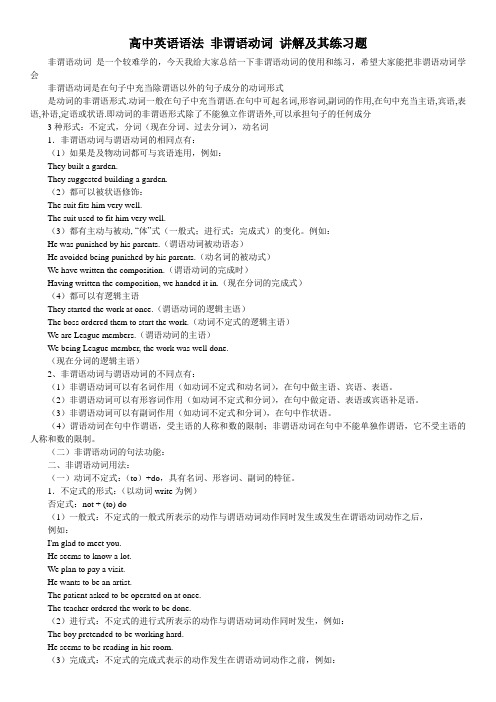
高中英语语法非谓语动词讲解及其练习题非谓语动词是一个较难学的,今天我给大家总结一下非谓语动词的使用和练习,希望大家能把非谓语动词学会非谓语动词是在句子中充当除谓语以外的句子成分的动词形式是动词的非谓语形式.动词一般在句子中充当谓语.在句中可起名词,形容词,副词的作用,在句中充当主语,宾语,表语,补语,定语或状语.即动词的非谓语形式除了不能独立作谓语外,可以承担句子的任何成分3种形式:不定式,分词(现在分词、过去分词),动名词1.非谓语动词与谓语动词的相同点有:(1)如果是及物动词都可与宾语连用,例如:They built a garden.They suggested building a garden.(2)都可以被状语修饰:The suit fits him very well.The suit used to fit him very well.(3)都有主动与被动, “体”式(一般式;进行式;完成式)的变化。
例如:He was punished by his parents.(谓语动词被动语态)He avoided being punished by his parents.(动名词的被动式)We have written the composition.(谓语动词的完成时)Having written the composition, we handed it in.(现在分词的完成式)(4)都可以有逻辑主语They started the work at once.(谓语动词的逻辑主语)The boss ordered them to start the work.(动词不定式的逻辑主语)We are League members.(谓语动词的主语)We being League member, the work was well done.(现在分词的逻辑主语)2、非谓语动词与谓语动词的不同点有:(1)非谓语动词可以有名词作用(如动词不定式和动名词),在句中做主语、宾语、表语。
高考英语语法专项练习:分词作状语 附练习题及答案
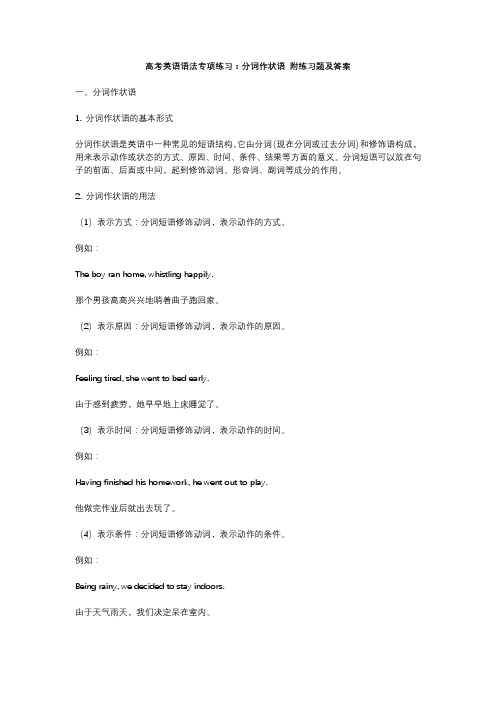
高考英语语法专项练习:分词作状语附练习题及答案一、分词作状语1. 分词作状语的基本形式分词作状语是英语中一种常见的短语结构,它由分词(现在分词或过去分词)和修饰语构成,用来表示动作或状态的方式、原因、时间、条件、结果等方面的意义。
分词短语可以放在句子的前面、后面或中间,起到修饰动词、形容词、副词等成分的作用。
2. 分词作状语的用法(1)表示方式:分词短语修饰动词,表示动作的方式。
例如:The boy ran home, whistling happily.那个男孩高高兴兴地哨着曲子跑回家。
(2)表示原因:分词短语修饰动词,表示动作的原因。
例如:Feeling tired, she went to bed early.由于感到疲劳,她早早地上床睡觉了。
(3)表示时间:分词短语修饰动词,表示动作的时间。
例如:Having finished his homework, he went out to play.他做完作业后就出去玩了。
(4)表示条件:分词短语修饰动词,表示动作的条件。
例如:Being rainy, we decided to stay indoors.由于天气雨天,我们决定呆在室内。
(5)表示结果:分词短语修饰动词,表示动作的结果。
例如:The boy fell off his bike, hurting his knee.那个男孩从自行车上摔下来,伤了膝盖。
3. 分词作状语的构成(1)现在分词作状语通常用来表示动作进行的方式、原因、时间、条件等,常常放在谓语动词之后,或者放在句首,用逗号与句子分开。
例如:He walked down the street, whistling a tune.他哼着曲子沿街走去。
Whistling a tune, he walked down the street.哼着曲子,他沿街走去。
(2)过去分词作状语通常用来表示动作已经完成或者被完成的情况,常常放在谓语动词之后,或者放在句首,用逗号与句子分开。
高中英语 不定式与分词综合练习(含答案)
高中英语不定式与分词综合练习(含答案)1. Choose the correct form of the verb in brackets:a. She seemed (surprised/surprising) when she heard the news. Answer: surprisedb. The view from the top of the tower is really (amazing/amazed). Answer: amazingc. I was (boring/bored) during the lecture.Answer: boredd. He found the book (interest/interesting).Answer: interesting2. Fill in the blanks with the correct form of the verb:a. It's important (eat) a healthy diet.Answer: to eatb. She pretended (not know) the answer.Answer: not to knowc. I don't feel like (go) for a walk today.Answer: goingAnswer: Visitinga. She had a lot of work. She didn't go out.Answer: Having a lot of work, she didn't go out.b. They missed the train. They had to wait for two hours. Answer: Having missed the train, they had to wait for two hours.c. He failed the exam. He didn't study hard.Answer: Failing the exam, he didn't study hard.d. She lost her keys. She couldn't open the door.Answer: Having lost her keys, she couldn't open the door.4. Rewrite the sentences using non-finite verbs:a. She was too tired to walk home.Answer: She was too tired that she couldn't walk home.b. They are too young to watch this movie.Answer: They are so young that they can't watch this movie.c. I'm glad I didn't miss the bus.Answer: I'm glad that I caught the bus.d. He was the first one to finish the test.Answer: He finished the test before anyone else.以上练习为不定式与分词的语法综合练习,希望可以对学生们的英语学习有所帮助。
高中英语语法一轮复习 第八讲非谓语动词(1)----动名词和分词用法讲解与练习
动名词和分词用法动名词是动词的一种非谓语形式,由动词+ ing构成,有一般式和完成式,主动式和被动式,否定形式为not doing,具有动词和名词的性质,在句中起名词作用,可作主语、宾语、表语和定语、状语和宾补。
(1)动名词作主语(动名词做主语谓语动词用单数)动名词作主语表示抽象动作,指一件已知的事或经验。
eg:①Driving a car on the crowded road is boring. ②Reading is my hobby.句型: It’s no use/no good doing sth 做.......没有用处/好处It’s a waste of time doing sth 做.... 浪费时间(2)常只用动名词作宾语的动词有:admit,avoid,appreciate,consider,dislike,enjoy,escape,excuse,finish,imagine,keep,mind,miss,practise, risk,resist,suggest等。
eg:①I can’t imagine marrying her. ②She managed to escape being punished.以下动词词组后面只接动名词作宾语:give up,belong to,look forward to,keep on,insist on,be busy,get down to,be devoted to,have difficulty/trouble(in),have a good/wonderful time (in)等。
eg:①I’m looking forward to hearing from you soon. ②He gave up smoking three years.(3)动名词作表语动名词作表语的时候,特别要注意:不要与正在进行时混淆。
动名词作表语,表达的是“某件事”等。
高中英语语法系列分词
高中英语语法系列分词分词是非谓语动词的一种形式,分为现在分词(doing )和过去分词(done)。
现在分词表主动,过去分词表被动或完成。
分词(短语)主要起形容词和副词的作用,可以作定语(1),表语(2),状语(3),或宾语补足语(4)( 1 ) He became a worker building roads .( 2 ) He is interested in studying English .( 3 ) He lay on the grass , talking with his teacher .( 4 ) We found the dog killed yesterday .I .表语分词作表语时,现在分词表主语的特征,过去分词表主语的状态:( 5 ) We are _____ at the news because it’s so ______. ( excite )( 6 ) The film was _____ . All the people were _____ to tears . ( move )( 7 ) The door remained ______ ( lock ) .( 8 ) He is very ______ , and we are ______ in his lessons . ( interest )掌握下面动词的现在分词和过去分词作表语的不同含义:encourage , puzzle , move ,disappoint , excite , , frighten , surprise ,astonish ,shock , amaze …II . 定语分词作定语时修饰名词或代词,一般说来,单个分词放在被修饰的前面,分词短语放在被修饰词的后面;现在分词表主动,过去分词表被动:( 9 ) The ____ ( suggest ) answer is supplied by our teacher .( 10 ) Soon he became a ____ ( lead ) person in the party .( 11 ) All the ____ ( work ) people in the world should unite together .( 12 ) All the guests ______ ( invite ) (to the party )are famous scientists .( 13 ) The man ______ ( talk ) happily came from the USA .( 14 ) The person understood the language ______ ( speak ) in this area .( 15 ) There was a _______ look on his face . He met a ______ tiger . ( frighten )( 16 ) The first textbooks ______ ( write ) dor teaching English in a foreign country came out in the 16th century .( 17 ) Football , first _____ ( play ) in the West , is very popular in the world now .分词短语作定语时,可以换成定语从句:( 18 ) Do you know the person giving us the talk ?Do you know the person who is giving.( 19 ) China is a country belonging to the Third World ( = which belongs to …) .III . 宾语补足语分词可以在see , hear , notice , find , watch , keep , get , have , feel , leave …等动词后的宾语作宾补,现在分词表主动,过去分词表被动:( 20 ) Do you see a girl _____ ( run ) towards us ?( 21 ) Suddenly he heard someone _____ ( knock ) gently on the window .( 22 ) He had us _______ ( laugh ) all the way .( 23 ) I am sorry to have kept you ______ ( wait ) so long .( 24 ) She was glad to find his son well ____ ( take ) care of in the school .( 25 ) We found him _____ ( lie ) under a big tree .( 26 ) Don’t leave the window ____ ( shut ) all the time .( 27 ) I will have my teeth _____ ( examine ) in the hospital .( 28 ) I can feel my heart _____ ( beat ) fast .( 29 ) I should like your homework ____ ( hand ) in at once .( 30 ) He once heard the song _____ ( sing ) in German .( 31 ) She can’t make herself _______ ( understand ) when she speaks English .在see , hear , watch , notice , feel …等动词后也可以用动词不定式作宾补,同现在分词的区分:现在分词表动作正在发生,不定式表动作已结束。
高中英语语法知识单项选择题专练 不定式、分词和动名词(word版含解析)
高中英语单项选择题分类汇总不定式、分词和动名词1. Is __ necessary to complete the design before National Day?A. thisB. thatC. itD. he分析:部分学生受到汉语思维的影响,理解为“他有必要国庆节之前完成设计吗?”错解为D;部分同学理解为“这”或“那”而解释为“这”或“那”而解释为A 或B。
本题着重考察不定式作主语的特殊结构,不定式作主语的时候只能用it作形式主语,因此选C。
2. Sandy could do nothing but __ to her teacher that she was wrong.A. admitB. admittedC. admittingD. to admit分析:部分同学误以为but是转折副词,看到could根据时态一致原则就错选为B;也可能知道but是介词,介词后面跟动词应该用-ing形式,就错选了C;或者知道but是特殊的介词,后面的动词形式应该接to do就选了D。
本题着重考察不定式作宾语的用法。
解题的关键在于but在此处是一个介词,一般要求跟带to的不定式作宾语,但是当but之前有实意动词do的任何形式(包括does, did, done),其后要求跟省略to的不定式作宾语。
因此答案是A。
3. “Is Bob still performing?”“I’m afraid not. He is said __ the stage already as he has become an official.”A. to have leftB. to leaveC. to have been leftD. to be left分析:部分同学知道句型sb is said后面接带to的不定式作主语补足语,没有注意到leave的动作发生在is said之前,并且leave和he之间是主动关系,而错误的选择了BD。
- 1、下载文档前请自行甄别文档内容的完整性,平台不提供额外的编辑、内容补充、找答案等附加服务。
- 2、"仅部分预览"的文档,不可在线预览部分如存在完整性等问题,可反馈申请退款(可完整预览的文档不适用该条件!)。
- 3、如文档侵犯您的权益,请联系客服反馈,我们会尽快为您处理(人工客服工作时间:9:00-18:30)。
练习8 分词
() 1. __________ with the best students, I still have a long way to go.
A. Having compared
B. To compare
C. Compared
D. Compare
() 2. The music of the film _________ by him sounds so ___________ .
A. playing, exciting
B. played, excited
C. playing, excited
D. played, exciting
() 3. __________ against the coming hurricane, they dared not leave home.
A. Warned
B. Having warned
C. To warn
D. Warn
() 4. In __________ countries, you can’t always make yourself _______ by speaking English.
A. English-speaking, understand
B. English-spoken, understand
C. English-speaking, understood
D. English-speaking, understood ()5. After _____________ the old man, the doctor suggested that he ___________ a bad cold.
A. examining, should catch
B. examined, had caught
C. examining, had caught
D. examined, catch
() 6. _____________ , Tom jumped into the river and had a good time in it.
A. Be a good swimmer
B. Being a good swimmer
C. Having been good swimmer
D. To be a good swimmer
()7. ________ how to read the new words, I often look them up in the dictionary.
A. Having not known
B. Not to know
C. Don’t know
D. Not knowing
()8. As his parent, you shouldn’t have your child ___________ such a book.
A. read
B. to read
C. reading
D. be reading
()9. He returned from abroad ______________ that his mother had been badly ill.
A. heard
B. having been heard
C. having phoned
D. having been phoned。
